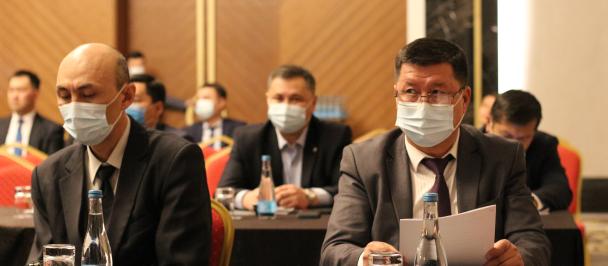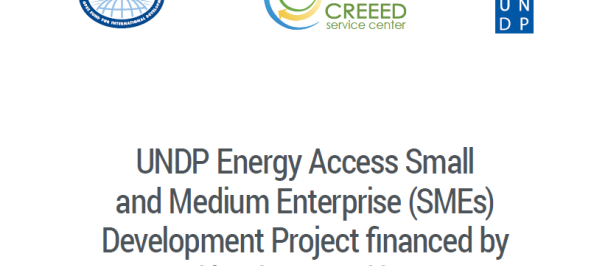On November 29-30, a training seminar on the energy efficiency of buildings "Municipal Energy Management (MEM), Energy Management Information System (EMIS), Monitoring, Reporting and Verification (MRV) in the Construction Sector" was held with the support of the State Agency for Architecture, Construction and housing and communal services under the Cabinet of Ministers of the Kyrgyz Republic, the United Nations Economic Commission for Europe (UNECE) and the United Nations Development Programme (UNDP) in the Kyrgyz Republic. An introduction to the training seminar was conducted by Maksat Amiraev, Head of the Housing and Utilities Department of the Gosstroy of the Kyrgyz Republic, Oleg Dzyubinsky, UNECE Regional Adviser, Nadejda Khamrakulova, UNECE Project Manager, and Lira Zholdubaeva, Head of the UNDP Climate Change and Disaster Risk Management Cluster.
Last month, Kyrgyzstan took part in the most important international event on climate, at the 26th session of the Conference of the Parties to the United Nations Framework Convention on Climate Change (UNFCCC COP-26) in Glasgow (Great Britain). Despite the fact that Kyrgyzstan is not a large emitter, our country presented a national climate pledge, the NDC document (Nationally Determined Contribution), noting its reaffirmation of commitment to the 2015 Paris Agreement, and committed to reduce greenhouse gas emissions by 2030 by 43.62% to keep global warming within 1.5 °C from pre-industrial levels. One of the measures to reduce emissions and mitigate the effects of climate change is to promote energy efficiency.
Achieving universal access to affordable, reliable, sustainable and modern energy for all by 2030 is set out in Sustainable Development Goal 7. To ensure universal access to energy, it is necessary to expand the use of renewable energy sources in the global energy balance and to seek to improve energy efficiency in the world. To accelerate progress towards universal access to sustainable energy in 2011, the UN Secretary-General launched the Sustainable Energy for All (SE4All) initiative, which aims to address three interlinked objectives to be achieved by 2030:
• Ensure universal access to modern energy services
• Double the global rate of improvement in energy efficiency
• Double the share of renewable energy in the global energy mix
To promote energy efficiency in the construction sector, compliance and capacity building are required at the national and regional levels. As an introduction to the training, Oleg Dzyubinsky, UNECE Regional Adviser, and Nadejda Khamrakulova, UNECE Project Manager, introduced the participants to the objectives and results of the project “Enhancing national capacities to develop and implement energy efficiency standards for buildings in the UNECE region” aimed at 17 countries of Eastern and South-Eastern Europe, the Caucasus, Central Asia, including Kyrgyzstan, and the Russian Federation. Within the framework of this project, a comparative study was carried out in the field of energy efficiency standards for buildings and considered the current situation in each of the countries with respect to the correspondence between the requirements of existing energy efficiency standards and their compliance, that is, what standards exist at the moment, how they correspond to the framework guidelines and how they are being observed. The result of this study was the identification of barriers to the adoption and implementation of more highly efficient energy efficiency standards, as well as consideration of possible solutions to fill the existing gaps. Based on this regional study, national studies were carried out in Armenia, Moldova and Kyrgyzstan.
The training seminar program, which was coached by international expert Matija Vajdić, covered aspects related to high energy efficiency standards in buildings and included the following topics:
• Energy audits procedure of buildings and multicriteria analysis
• Energy Management Information System and examples of energy management system tools
• Municipal energy management as a part of the national monitoring, reporting and verification system
• Institutional, organizational and legal aspects of energy management and monitoring, reporting and verification at the global and EU levels
• Energy Management (EM) and Monitoring, Reporting and Verification (MRV) in the buildings sector
• Economic evaluation and funding possibilities for energy efficiency measures in buildings
It should also be noted that many of the training participants are simultaneously trained to conduct an energy audit in buildings and structures. This training acquainted the future energy auditors of our country with the best world practice in this area. To date, the energy audit is only advisory in nature, but the thorough and comprehensive training of audit specialists shows the sector's readiness for more decisive reforms in promoting energy efficiency in the construction sector.
Participants' follow-up work with new acquired knowledge and experience of high standards in energy efficiency in buildings will be a positive contribution to the achievement of Sustainable Development Goal 7 and the fulfillment of our climate commitments.

 Locations
Locations

